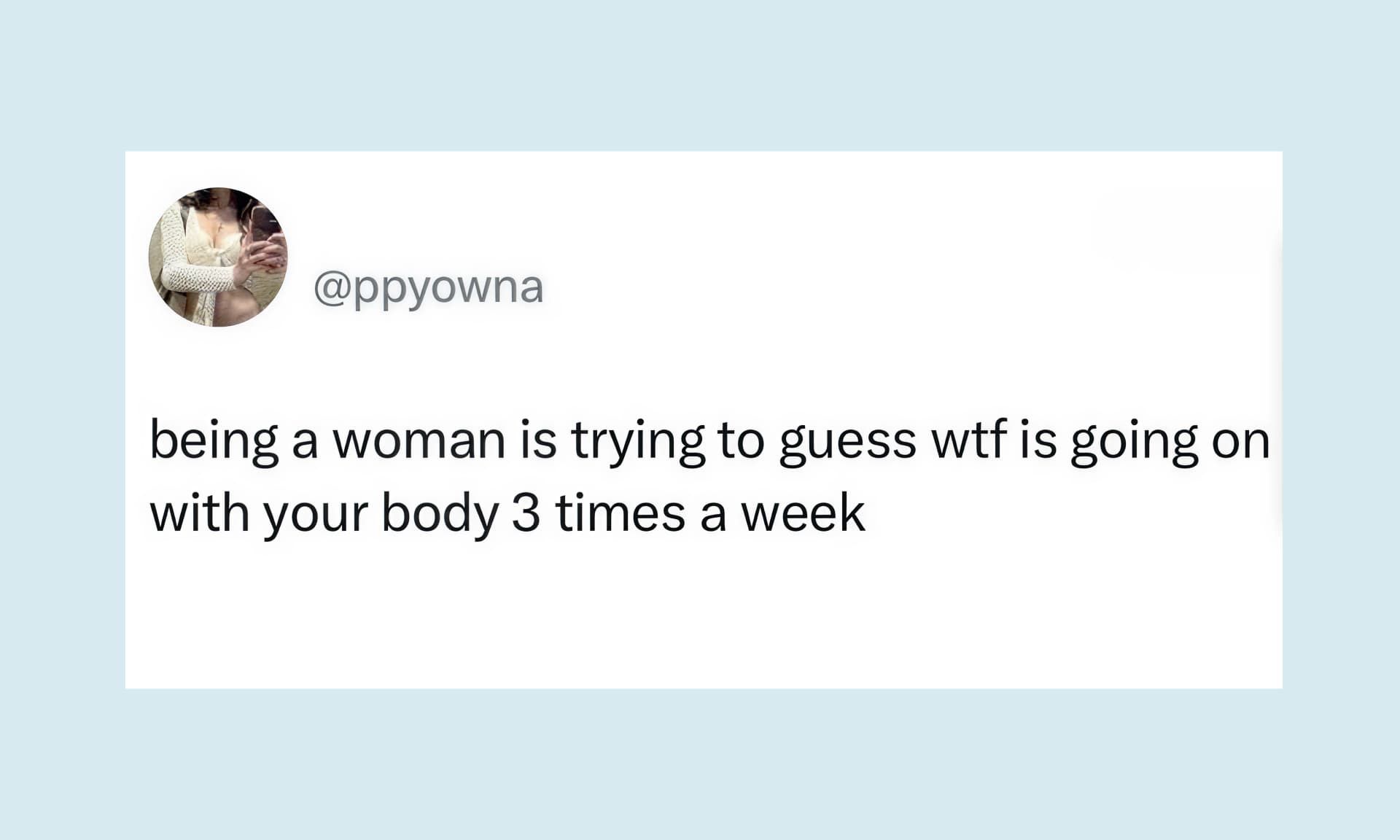We’re Not Too Young For This
I met up with friends for our 20-year high school reunion — and was stunned by how many of us had been thrown a medical curveball. We used to compare jobs and apartments. Now it’s mammograms and MRIs.
It seems way too soon for these convos. But rates of early-onset cancers — meaning those diagnosed before 50 — are rising fastest among millennial women. That includes colorectal, breast, prostate, stomach, and appendix (a new trend that’s concerning experts). Researchers point to possible culprits like lifestyle shifts (hi, desk jobs and ultra-processed snacks), environmental exposures, and gut microbiome changes, though nothing definitive yet.
Scary? Yes, but being scared of a diagnosis could actually put us off the screenings that might save our lives. A study from last year found that women who get a false positive mammogram are more likely to delay future screenings. And they’re not alone: three in four women skip or delay a Pap smear due to fear or discomfort.
Still, more of us might face a diagnosis perhaps sooner than we think — especially as new blood tests able to early detect cancer arrive. Instead of letting that reality turn you away from screenings, here’s how to stay on top of your health:
Schedule preventive care appointments. We know, we know… You don’t have time to hang out on hold, or know now if you’re free for their first available on April 22, 2026 at 2 pm. But these “let-that-sink-in” research findings are… very motivating.
Do your homework. Your doctor especially wants to know more about specific relatives.
Make these six lifestyle tweaks that may lower your cancer risk. They’re not cure-alls, but they can help.
Feeling anxious? Try using “worry time” to stop spiraling.
When a friend is diagnosed, here’s what to say. FYI: Living with cancer may not mean what you think it does, and even has some calling for a rebrand.
— Anna “If I Get Through a Colonoscopy, I’ll Buy Myself a Little Treat” Davies
We’re Not Too Young For This
I met up with friends for our 20-year high school reunion — and was stunned by how many of us had been thrown a medical curveball. We used to compare jobs and apartments. Now it’s mammograms and MRIs.
It seems way too soon for these convos. But rates of early-onset cancers — meaning those diagnosed before 50 — are rising fastest among millennial women. That includes colorectal, breast, prostate, stomach, and appendix (a new trend that’s concerning experts). Researchers point to possible culprits like lifestyle shifts (hi, desk jobs and ultra-processed snacks), environmental exposures, and gut microbiome changes, though nothing definitive yet.
Scary? Yes, but being scared of a diagnosis could actually put us off the screenings that might save our lives. A study from last year found that women who get a false positive mammogram are more likely to delay future screenings. And they’re not alone: three in four women skip or delay a Pap smear due to fear or discomfort.
Still, more of us might face a diagnosis perhaps sooner than we think — especially as new blood tests able to early detect cancer arrive. Instead of letting that reality turn you away from screenings, here’s how to stay on top of your health:
Schedule preventive care appointments. We know, we know… You don’t have time to hang out on hold, or know now if you’re free for their first available on April 22, 2026 at 2 pm. But these “let-that-sink-in” research findings are… very motivating.
Do your homework. Your doctor especially wants to know more about specific relatives.
Make these six lifestyle tweaks that may lower your cancer risk. They’re not cure-alls, but they can help.
Feeling anxious? Try using “worry time” to stop spiraling.
When a friend is diagnosed, here’s what to say. FYI: Living with cancer may not mean what you think it does, and even has some calling for a rebrand.
— Anna “If I Get Through a Colonoscopy, I’ll Buy Myself a Little Treat” Davies
Got a minute? We want your take!
What do you love about our newsletter — and what should we do more (or less) of? Tell us here.
What's Making the Rounds

All your feet want for the holidays is for you to do “W lunges” (and these 8 other ankle exercises) before party season hits.
Add this sneaky protein to any soup for an easy way to hit your macro goals… and feel cozy doing it.
Worth a share in the family chat: One routine vaccine for older adults may protect against a surprising list of health issues down the line.
Ophthalmologists are begging… please change this iPhone setting.
If you have a massage gun, chances are you’re using it wrong.
“Anhedonia” can be an early warning sign of mental health distress — here’s what one psychiatrist wants you to watch for.
Forget melatonin, new research suggests two types of foods could help you sleep better.
Kim Kardashian says her “little” brain aneurysm is the result of stress. Doctors say it’s probably not that simple.
Brain Feel Like It’s Buffering?

If your brain were a house, mitochondria would be the Wi-Fi router. When the signal is strong, your neurons fire at 5G speeds, powering you through the group chat, a work Zoom, and figuring out your Amazon order. When it’s not? Everything lags… including your mood.
Now, scientists are zeroing in on these tiny brain “powerpacks” as a missing link in mental health. Research out of Harvard suggests that faulty mitochondria may play a role in conditions like depression, bipolar disorder, and anxiety — and even in some age-related diseases like dementia, Parkinson’s, and Alzheimer’s.
Wait, mitochondria… like from 10th-grade biology?
Yep. Each neuron depends on mitochondria to make energy. The brain burns through more energy than any other organ, and when its batteries falter, neurons can’t fire properly. That can lead to sluggish thinking, poor emotional regulation, and the fatigue that often accompanies mood disorders. Scientists are finding that when mitochondria thrive, so does your overall brain health.
So how do I keep them charged?
Science shows that mitochondria respond to how you move, rest, and think. Studies suggest that good sleep helps them repair, while chronic stress can drain their energy reserves.
Do I need supplements or fancy biohacks?
Not really. While researchers are testing new “mito-boosters,” these are still in the lab stage and not ready for a GRWM routine. Right now, the best-known supports are low-tech and free: sleep, movement, and stress management.
For Your Sanity:
Increase your HIIT workouts. Exercise literally tells your body to make more mitochondria and keep existing ones healthy. The best type: Short (as little as 2 minutes), regular bursts of movement drive mitochondrial biogenesis, aka better battery recharging for neurons. Want to add some to your routine? Here, some no-jumping-required workouts that raise your heart rate.
Stop scrolling, start Wordling. Mitochondria make the energy your brain needs to produce and release acetylcholine (aka ACT), the chemical messenger behind focus, memory, and decision-making. When your mitochondria slow down, ACT levels drop too, which can dim mental clarity and slow thinking. But you can regain it: One study of older adults found that 30 minutes of structured brain games could increase ACT levels.
Eat right. Choline, the building block used to make ACT, can be found in these types of whole foods. Eat plant-based? Talk with your doctor about supplement strategies.
Focus on your mental health, right now. A recent Columbia study found that people who reported more “positive life experiences” had stronger “energy signatures” in brain cells. Getting the help you need now not only restores your emotional energy now, but your cellular energy later. (Looking for online therapy options that accept insurance? Start here.)
Your Perimenopause Playbook
FEATURED EXPERT:

Kelly Casperson, MD
Urologist and author of The Menopause Moment
TheSkimm team was able to connect with Kelly Casperson, MD, urologist and author of The Menopause Moment, at an event sponsored by the digital perimenopause platform Perry. One surprising takeaway:
Don’t wait until your annual exam to talk about perimenopause symptoms. Instead, book a dedicated appointment to speak specifically about the condition. Do your homework beforehand: Jot down symptoms, questions, and possible treatment options. “The doctor’s office is not the place to learn anymore — it’s where you want to partner with the doctor [to make informed decisions],” says Casperson.
Plus, Casperson and other experts answer 10 more of our burning questions on perimenopause.
No Whey!

Fun fact to drop by the office fridge: That watery layer on your yogurt isn’t gross, it’s whey, and it’s loaded with protein. Don’t dump it, stir it back in to ensure you get all the nutrients in your yogurt. Bonus points: Add some chia seeds and brag about your snack to the proteinmaxxing bro in the cubicle next to yours.
Conquer Daylight Savings Blues with Vitamin D
Vitamin D is one supplement many doctors largely stand behind, a daily dose can help keep your bones strong, your immune system healthy, and your mood upbeat. While sunshine is the best source, the darker days ahead may make it hard to come by. Finding a good supplement doesn’t require wandering the vitamins aisle aimlessly, though. Here, the best ones to add to cart.
Here’s the full list of the best vitamin D supplements, according to experts.
Our First-Ever Live Cooking Demo Is Serving Cookies (and Solutions)

Skimm+ is going live in your kitchen — with bestselling author Dan Pelosi (@GrossyPelosi) as your guide. In just 60 minutes, you’ll learn how to make no-fuss, gift-worthy cookies that are perfect for that holiday party…or that host you don’t know the most. Bonus: First 70 people to sign up will get a free copy of his new cookbook Let's Party.

Subscribe to Skimm Well
Sign up here to receive our wellness newsletter filled with actionable advice, expert-vetted content, product recs, and more — delivered directly to your inbox.